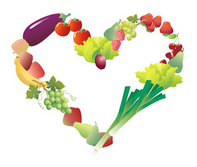 We know the heart is an important pump that keeps the blood flowing through the lungs and into the body providing vital oxygen and nutrients and fluids to the body organs, cells and structures.
We know the heart is an important pump that keeps the blood flowing through the lungs and into the body providing vital oxygen and nutrients and fluids to the body organs, cells and structures.
So how do you keep your heart healthy? Well the trick is to know what heart's need and want to do well!
Firstly from a nutritional medicine point of view minerals are very important. Without a good supply of calcium, magnesium, potassium, sodium and other key minerals the heart electrical system doesn't do well. Selenium is particularly important for heart muscle and its deficiency alone can create heart failure. Minerals are rich in land and ocean vegetables as well as sea salts and mineral salts.
Next the heart likes oils or healthy fats. It needs a good supply of omega oils which are ideally plant or wild fish based or from grass fed animals so that the oils are toxin free and fresh. Fish oils are tricky as they need to be filtered for mercury and metals and there is work being done to grow algae to make omega oils for us to consume. A whole wild fresh Schnapper from the Hauraki Gulf represents a good source of a whole bunch of proteins and oils for your heart.
Omega 3 or fish oils help keep cholesterol healthy and keep your blood flowing and prevent clots.
Plants provide some great oils and eating a diet rich in greens can really help your heart health. Plenty of greens!
 Chlorophyll – the green substance in plants is like an oxygen carrying health giving substance – not unlike the red colour in our blood that is carrying oxygen with iron and haemoglobin in red blood cells.
Chlorophyll – the green substance in plants is like an oxygen carrying health giving substance – not unlike the red colour in our blood that is carrying oxygen with iron and haemoglobin in red blood cells.
The heart loves healthy proteins from plants and animal sources.
The heart loves Vitamin E. Vitamin E is rich in nuts and seeds and there is some in some vegetables and oils or the centre or "germ" of some grains like wheat germ (not ideal if you are on gluten free diet).
Vitamin E is like a natural aspirin. Research shows that it inhibits (slows or stops) the clotting of platelets so that they don't clot together and form a heart attack or stroke. Vitamin E also helps your body carry oxygen and is great if you have to go somewhere high altitude to help you get more oxygen.
When you take Vitamin E you will notice your oxygen in your body increase and your hands and feet get warmer and more pink and healthy looking.
Vitamin E is an antioxidant and protects the arteries from damage that if left unchecked could lead to atherosclerosis (hardening of the arteries due to damage and inflammation). Vitamin E actually prevents cholesterol from getting damaged when it goes to try sort out inflammation in the body.
Restless legs and leg arteries even improve their circulation with Vitamin E. Take around 400 units per day with a meal.
Garlic is another food that naturally thins the blood and helps prevent heart attacks, strokes, blood clots and even second heart attacks if you had one already.
Garlic also lowers blood pressure naturally.
Magnesium, fish oils, garlic and Vitamin D all help lower blood pressure naturally. Magnesium is very good for helping prevent abnormal heart rhythms and is rich in green foods.
Dr Libby's new book Real Food Chef is all about how to cook to add more green foods to your diet – see www.drlibby.com.
Victoria Boutenko has a great green smoothie book! She will be here in Auckland doing a "green smoothie" demonstration at the Healthy Living Show November 2012. See this link: http://www.healthylivingshow.co.nz/exhibitor/victoria-boutenko-%28usa%29.aspx
So for all you health "rebels" out there it seems there are plenty of natural options to keep your cholesterol and the lining of your blood vessels healthy as well as your arteries.
Oh and did I mention exercise? We'll leave that for next time!
